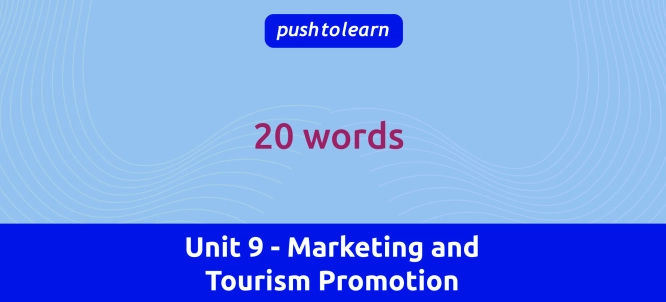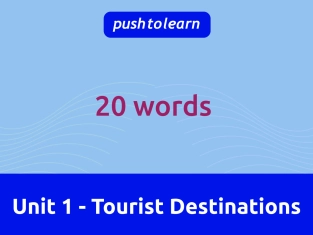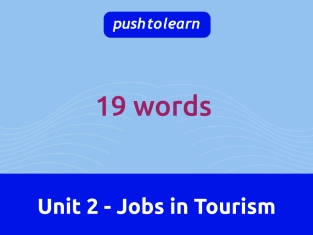by PushtoLearn
Unit 9 - Marketing and Tourism Promotion
Table of Contents
Unit 9 - Marketing and Tourism Promotion Exercises and Flashcards
These exercises focus on Unit 9 - Marketing and Tourism Promotion - English for International Tourism Pre-intermediate
Vocabulary List for Marketing and Tourism Promotion
Marketing Campaign (noun)
Definition: A series of coordinated activities designed to promote a product or service.
Example: The marketing campaign for the new resort included advertisements and social media posts.
Explanation: Essential for creating awareness and driving customer interest.
Target Audience (noun)
Definition: A specific group of people identified as the intended recipients of a marketing message.
Example: The target audience for the ad campaign was young travelers.
Explanation: Helps tailor promotional efforts to the right demographic.
Brand Awareness (noun)
Definition: The extent to which consumers recognize a brand.
Example: The tourism board’s efforts increased brand awareness of the region.
Explanation: Crucial for building familiarity and trust with potential customers.
Online Presence (noun)
Definition: The visibility of a business or brand on digital platforms.
Example: Improving the online presence through a website and social media boosted bookings.
Explanation: A strong online presence is essential for reaching today’s digital consumers.
Promotional Offer (noun)
Definition: A temporary deal or discount to encourage purchases.
Example: The travel agency’s promotional offer included free airport transfers.
Explanation: Drives customer interest and boosts sales during specific periods.
Social Media Strategy (noun)
Definition: A plan for using social media platforms to achieve marketing goals.
Example: Their social media strategy focused on showcasing user-generated travel photos.
Explanation: Vital for engaging with audiences and building brand loyalty.
Seasonal Promotion (noun)
Definition: A marketing effort aligned with specific times of the year.
Example: The seasonal promotion offered discounts on winter ski packages.
Explanation: Encourages sales during peak and off-peak seasons.
Discount Code (noun)
Definition: A code that customers can use to get a discount on a purchase.
Example: Enter the discount code “SUMMER20” to save 20% on your booking.
Explanation: A popular method for incentivizing online purchases.
Product Launch (noun)
Definition: The introduction of a new product or service to the market.
Example: The product launch for the luxury cruise was accompanied by a grand event.
Explanation: Creates excitement and attracts initial customers.
Influencer Marketing (noun)
Definition: Promoting products or services through influential individuals on social media.
Example: Influencer marketing helped the resort gain exposure among young travelers.
Explanation: Effective for building trust and reaching niche audiences.
Customer Engagement (noun)
Definition: Interactions between a business and its customers that foster loyalty.
Example: Hosting a travel Q&A increased customer engagement on Instagram.
Explanation: Keeps customers interested and invested in the brand.
Travel Voucher (noun)
Definition: A certificate or code redeemable for travel services.
Example: Guests received a travel voucher for a future stay as part of the promotion.
Explanation: Encourages repeat bookings and customer retention.
Direct Marketing (noun)
Definition: Promotional activities aimed directly at specific consumers.
Example: The hotel used direct marketing to send personalized offers to its email list.
Explanation: Allows for tailored messaging and measurable results.
Event Sponsorship (noun)
Definition: Financial support for an event in exchange for promotional opportunities.
Example: The airline’s event sponsorship included branding at the music festival.
Explanation: Builds brand visibility and aligns with target audience interests.
Email Campaign (noun)
Definition: A series of emails sent to promote products, services, or events.
Example: The email campaign highlighted special deals for the holiday season.
Explanation: A cost-effective way to reach a large audience.
Promotional Materials (noun)
Definition: Printed or digital resources used to advertise products or services.
Example: The travel agency distributed promotional materials like brochures and posters.
Explanation: Supports marketing campaigns with tangible or visual aids.
Public Relations (PR) (noun)
Definition: Activities aimed at managing the public perception of a brand.
Example: The hotel’s public relations team organized a press tour to promote the new property.
Explanation: Builds and maintains a positive brand image.
Brand Loyalty (noun)
Definition: The tendency of customers to continue using a specific brand’s products or services.
Example: Consistent quality and excellent service foster brand loyalty.
Explanation: Ensures repeat business and long-term success.
Word-of-Mouth (noun)
Definition: Recommendations made by customers to others, often organically.
Example: Word-of-mouth about the excellent tour spread quickly among travelers.
Explanation: A powerful form of marketing that builds trust and credibility.
Market Research (noun)
Definition: The process of gathering information about consumers and market trends.
Example: Market research revealed a growing interest in eco-friendly travel.
Explanation: Helps businesses make informed decisions and tailor their strategies.

Wordlist for Unit 9 - Marketing and Tourism Promotion - English for International Tourism Pre-intermediate
|
Word |
Example |
|
marketing campaign |
Our latest marketing campaign increased sales by 30% |
|
target audience |
Defining your target audience is crucial for an effective campaign |
|
brand awareness |
The company's focus is on improving brand awareness in new markets |
|
online presence |
Building a strong online presence is essential for modern businesses |
|
promotional offer |
Customers responded well to the latest promotional offer |
|
social media strategy |
A strong social media strategy helps connect with customers directly |
|
seasonal promotion |
The store launched a seasonal promotion for the holidays |
|
discount code |
Enter the discount code at checkout for a 10% reduction |
|
product launch |
The product launch event attracted media and influencers |
|
influencer marketing |
Many brands rely on influencer marketing to reach new audiences |
|
customer engagement |
Customer engagement increased after introducing loyalty programs |
|
travel voucher |
As a prize, they offered a travel voucher for a weekend getaway |
|
direct marketing |
Direct marketing allows companies to reach customers personally |
|
event sponsorship |
Event sponsorship can increase brand visibility at popular venues |
|
email campaign |
An email campaign can be a cost-effective way to communicate with customers |
|
promotional materials |
The team prepared promotional materials for the upcoming trade show |
|
public relations (PR) |
Public relations play a significant role in shaping a brand's image |
|
brand loyalty |
High-quality customer service strengthens brand loyalty |
|
word-of-mouth |
Positive word-of-mouth can boost a brand's reputation without any cost |
|
market research |
Conducting market research helps identify customer needs and preferences |
FAQ
Why is market research important in tourism promotion?
Market research identifies customer preferences, emerging trends, and opportunities, enabling businesses to tailor their services and campaigns effectively.
How does social media strategy help tourism businesses?
A strong social media strategy engages customers, builds brand loyalty, and showcases destinations to a global audience.
What is influencer marketing, and why is it effective?
Influencer marketing uses trusted individuals with large followings to promote services, reaching niche audiences and building credibility.
How can promotional offers drive customer engagement?
Promotional offers such as discounts or travel vouchers incentivize purchases and attract new customers during peak and off-peak seasons.

